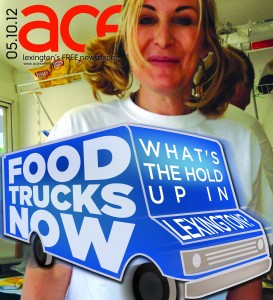This article appears on page 6 of the May 10 print edition of Ace Weekly.
Streets and Eats

Will Lexington Free the Food Trucks?
“City governments across the country are threatening to kill the food truck revolution with dumb regulations…Municipal authorities need to learn to welcome the explosion of innovation happening around them and stop trying to choke it off.”
–Matthew Yglesias, Slate, February 2012
Every year around this time, a couple hundred Lexington leaders pony up a couple grand each to board chartered jets on an annual junket to explore a visionary city that might serve as a role model for Lexington. The idea is to network, make connections, and search for great ideas that might work here. Thursday Night Live is one success story. Last year, the leadership group visited Greenville, South Carolina. The June 2012 destination will be San Antonio.
Two of the model cities visited in recent years — college towns Madison, Wisconsin and Austin, Texas — are known for their vibrant street food culture. They have each regulated the industry differently, but have arrived at a comparable end game: streets teeming with food lovers who can appreciate everything from a $2 buck peripatetic taco to a sitdown $20 dollar cocktail, all in the same evening, all in the span of a few city blocks. (One LFUCG council person crankily observed during open session after the Austin trip, “Lexington is weird enough,” in response to the “Keep Austin Weird” credo embraced from the top down in the music city.)
In San Antonio — site of the upcoming June visit — there are food truck parks. A food-truck-finder app was launched at a recent April weekend hackathon by Sweb Development.
In Louisville, mobile food vendors worked so successfully with City Hall on simplifying regulations that Mayor Greg Fischer’s office hosted a lunchtime confluence of ten trucks in April, with the goal of it being a monthly event. He has publicly stressed his commitment to cementing Louisville’s reputation as a “foodie” city, reminding visitors that they can enjoy everything from hot dogs to haute cuisine downtown.
The city of Tampa hosts the Mayor’s Food Truck Fiesta the first Wednesday of every month. (Tampa Mayor Bob Buckhorn says food trucks “fuel the local economy.” Video posted at the end of this story.)
_____
Lexington has not been so visionary.
Food trucks here occupied a tenuous, precarious Private-Property-Only position long before a Task Force was formed a year ago (April 20, 2011) to deal with their status. The Itinerant Merchant Task Force grew out of west  Lexington’s complaints about mobile tacos, but soon morphed to address the much larger issue of mobile food vendors who want to exist as a permanent part of our community, outside the confines of fair food and funnelcakes.
Lexington’s complaints about mobile tacos, but soon morphed to address the much larger issue of mobile food vendors who want to exist as a permanent part of our community, outside the confines of fair food and funnelcakes.
Local chef Mark Jensen says, “We eat dishes that have a sense of place, a connection to a spot in the world. Remembering eating a warm baguette stuffed with delicious sausage and creamy onions in the Loire valley, a plate of perfect polpettone in Rome, or the greatest grilled cheese known to man at my Dad’s side in Vermont.” As he works to get his food truck up and running, he adds, “My ‘Fork in the Road’ mobile galley is going to allow me to bring great dishes to more people in a casual, open air milieu.” (Chicago has a Getta Polpetta truck.)
Southern Foodways Director and NYT food writer John T. Edge has a new Truck Food Cookbook out, lauding the intimacy street food offers between diners and proprietors. It’s a sentiment Jensen echoes when he says, “Local sourcing, regional treatment of dishes, a dance of product and practice. I want to be right there with their enjoyment. On the street, eating with the people who know what it’s all about.”
Hardwood Pizza Company launched in 2009 when Jim and Kristin Voskuhl and partner Jason Hernandez “saw an opportunity to bring something fresh and unique to Lexington.” She says, “We saw what was available and thought we could do something a little different. We were so naive to the laws then. We thought if we make great pizza, we could overcome some dated ordinance limiting street food to nacho cheese and the like.”
She echoes Jensen’s love of place, saying, “We had an opportunity to spend some time in Rome, Italy. Mobile food is popular there. Not like how we think of it, but more like little store fronts where you order food and take it with you no sit down area available. Of course, we had some amazing pizza there and aspire to bring that back here. Really simple pizzas kissed by the fire and a glass of wine. Just perfect.” (Proust had his madeleine.)
___
Consumer demand is high and health department issues can be worked out, but pushback from bricks and mortar establishments is entrenched, stubborn, and not easily overcome. Food truck fans and supporters argue (accurately) that a rising tide lifts all boats — vibrant culinary corridors enhance and invite economic development — they don’t repel it.
Husband and wife team, Sean and Amanda Tibbits, are the proprietors of Cluckin Burger (which often dishes up their jerk chicken burgers at Lexington Beerworks on N. Limestone). He points out, “Food trucks are subject to the same regulatory fees and taxes as restaurants, and then some. In short, we pay $30 every two weeks to the Health Department, $25 to the Building Inspector for every location where we set up, and Division of Revenue up to $250 annually for an Itinerant Merchant permit. As for property taxes, restaurants pay 1.09 percent annually and we pay the state 6% Motor Vehicle Usage tax PLUS the local Fayette county vehicle property taxes.”
He adds, “When food trucks are embraced by their local economies, they can be used to help increase foot traffic anywhere they go. Food trucks not only generate jobs for their employees and suppliers, but also help to increase sales in existing retail shops and introduce customers to shops and neighborhoods they might never have ventured into before without chasing down their favorite truck.”
_____
Lexington’s emerging food truck scene has joined to form the Bluegrass Food Truck Association. Sean Tibbits is the newly-elected director.
 In April, the Association hosted the first Bluegrass Food Blast at the corner of Main and Midland, in the rocky lot where a CVS pharmacy was once planned. Over a thousand diners attended, and most vendors sold out. The few glitches itemized on facebook — long lines and not enough vendors — are the typical, nascent, cart-before-the-horse complaints: it will be difficult to find dozens of food trucks and carts offering everything from bagels to shawarma to Czech ptacky in a town where they have been legislated almost out of existence. The event was heavily monitored for compliance by city departments from Revenue on down. Several facebook questions were posed asking why there’s a focus on downtown — couldn’t the food trucks operate in the suburbs? As with downtown, they’d have to be invited. To private property. As various proprietors have pointed out at recent meetings, it isn’t practical for them to just circle Man o’ War hoping to spot customers.
In April, the Association hosted the first Bluegrass Food Blast at the corner of Main and Midland, in the rocky lot where a CVS pharmacy was once planned. Over a thousand diners attended, and most vendors sold out. The few glitches itemized on facebook — long lines and not enough vendors — are the typical, nascent, cart-before-the-horse complaints: it will be difficult to find dozens of food trucks and carts offering everything from bagels to shawarma to Czech ptacky in a town where they have been legislated almost out of existence. The event was heavily monitored for compliance by city departments from Revenue on down. Several facebook questions were posed asking why there’s a focus on downtown — couldn’t the food trucks operate in the suburbs? As with downtown, they’d have to be invited. To private property. As various proprietors have pointed out at recent meetings, it isn’t practical for them to just circle Man o’ War hoping to spot customers.
But there are dreams for a better day. Kristin Voskuhl points out, “an active and vibrant downtown is nearly required these days to keep the coveted ‘creative class.’ Mobile food can be really interesting too, almost artistic. Korean BBQ tacos, lobster rolls, fried green tomato sandwiches, burgoo truck?” (Washington DC, for example, has the TaKorean truck.)
Proprietors at the Blast wore their Free the Food Trucks t-shirts, the shorthand version of their mission to take their awareness campaign to the streets.  They’ve pointed out, “Since food truckers don’t have quiet, dark rooms where they can smoke cigars and buy dinners for influential people in town, the BFTA has a clear ambition to bring this fight to the public and let the market decide our fate rather than some wheeler dealers and politicians.”
They’ve pointed out, “Since food truckers don’t have quiet, dark rooms where they can smoke cigars and buy dinners for influential people in town, the BFTA has a clear ambition to bring this fight to the public and let the market decide our fate rather than some wheeler dealers and politicians.”
While food truck culinary culture thrives in markets like Portland and Austin, most cities experience spirited debate and controversy comparable to Lexington’s. One Brooklyn neighborhood characterizes ongoing skirmishes between food carts and brick and mortars as a Cold War. Mobile food reform was introduced to Chicago’s City Council on July 28, 2010, and is still pending. The Institute of Justice hosted the Chicago Mobile Food Symposium in April. IJC attorney Bert Gall was quoted at the Symposium as saying, “The city cannot bargain away the right of street food entrepreneurs to earn an honest living in order to protect established restaurant interests from competition. The city does not have the power to do that under the 14th amendment, which guarantees to all Americans the right to earn an honest living free from arbitrary government interference” (foodtruckfreak.com).
____
Lexington has had a year of Task Force meetings, and a pilot program might emerge this summer. Meanwhile, there is no shortage of downtown space. Triangle Park recently re-opened to much fanfare (but with a Cafe in place). There’s a giant pasture in the center of town that sits idle most of the year. The opportunity for leadership and vision exists, from both private enterprise and elected officials. Downtown developer Phil Holoubek welcomed the first food blast to his property.

So what’s next? Tibbits says, “I would like to see Lexington achieve the same goals already met by Louisville and Cincinnati in their first year following regulations which resulted in quadrupling the number of trucks operating in each city and helped those cities gain recognition for their food culture and business friendly policies.”
The schedule for Itinerant Merchant Task Force Meetings are published on the LFUCG site, and the next one is May 14, 2012 at 1 pm. There will be another Food Blast in June. Stay tuned to aceweekly.com and Ace on Twitter for ongoing developments in this story and
YOU MIGHT ALSO LIKE
What Lexington Needs: Food Trucks (Keepin’ Austin Weird)
Where to eat in Lexington, Kentucky: Ten Downtown
YOU CAN WATCH THE TAMPA MAYOR’S PROMOTIONAL FOOD TRUCK FIESTA VIDEO HERE









